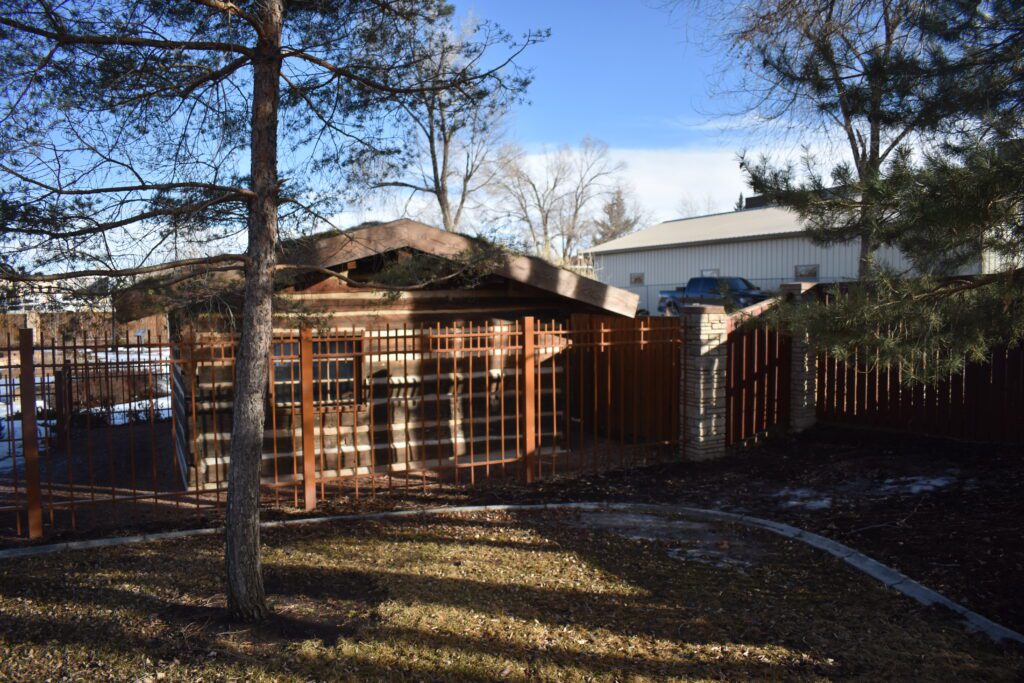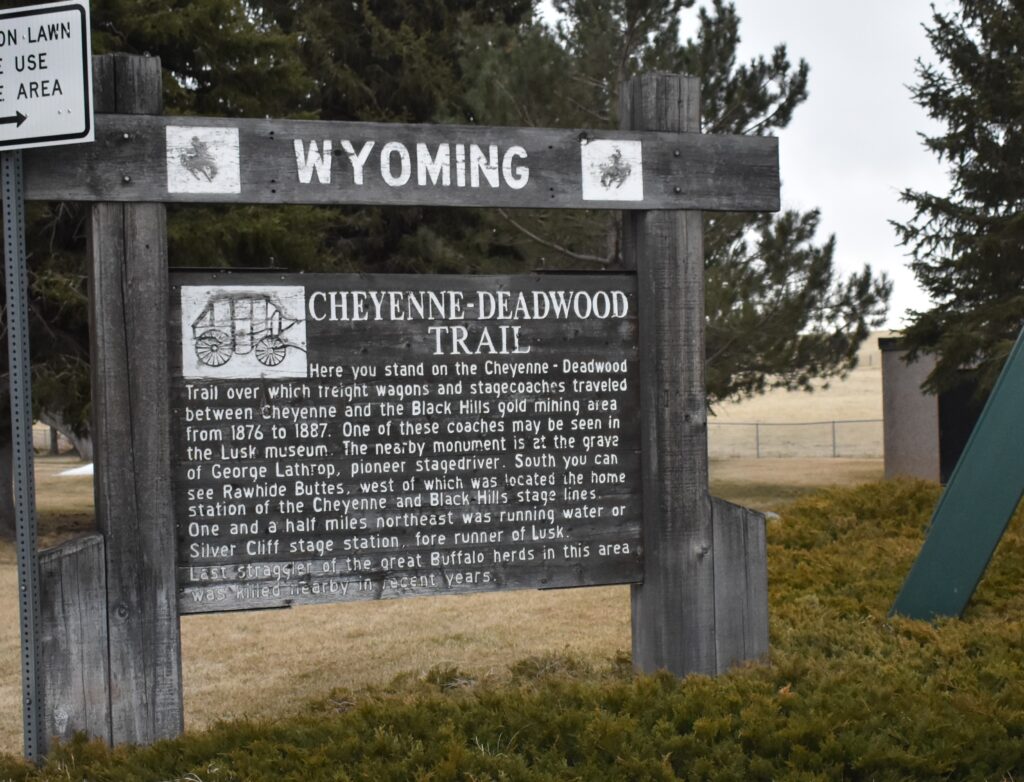alt
History: Road Agents In Wyoming

Road Agents or robbers were a fact of life in the early days in Wyoming.
Even Sheridan had its share, like this story in The Buffalo Echo, on January 7, 1887 – The Town of Sheridan – Sheridan is located between the Little and the Big Goose creeks, at their confluence is 40 miles in northwesterly direction from Buffalo, about 15 miles south of the line dividing Montana and Wyoming territories. 125 miles by the stage road from Custer Station, Mont., and on the Rock Creek and Junction City stage line, which is of Star route fame and the longest stage line in the United States, if not in the world, at the present time….The present site, containing forty acres, was selected by the members of town site company organized about May 10, 1882 It was surveyed and planted May 20th, by J. Dow civil engineer. At that time no buildings had been constructed on the site, close to the stage ford across Big Goose Creek. There was small dirt-roof log cabin in which J.D. Loucks kept small store and the Mandel post office. Near to this building stood log stable and small log cabin said to have been built and occupied by horse thieves and road agents. This was all that existed of Sheridan, June 1st, 1882. By Dec. 1st following, only four buildings bad been constructed, one dwelling house, one saloon building, blacksmith shop and small warehouse.

Road agents operated mainly by attacking stage coaches which ran around Wyoming, carrying passengers, mail and gold shipments from the mines. Sometimes, the robbers very brazen in their attempts to obtain the easy wealth.
In August of 1897, there was a daylight stage robbery in Yellowstone National Park. The road agents dressed as cavalrymen and when the stage stopped, they robbed the passengers. Except for Col. Hawkins.
The Cheyenne Daily Sun-Leader, August 31, 1897 – Fooled the Robbers How Col. Hawkins Saved $500 in the Yellowstone Robbery. Word was received in this city today from the friends of Col. Hawkins, who is well known in. Cheyenne, that he was one of the numbers in the Yellowstone Park when the stage was held up recently and by an exercise of good judgment and presence of mind saved himself $500.
As the stage was nearing the place of the robbery, Col. Hawkins heard the riders approaching and was the first who heard the order to halt. Quickly as possible and with little show; the officer tossed his purse containing $600 into the bushes at the side of the road, when the passengers were all strung out in a line, the robbers took $10 from Mr. Hawkins and seemed satisfied. Although it took some careful hunting. Col. Hawkins covered his purse after the robbery and received his reward for his quick and efficient actions.

This daring robbery brought Wyoming to the attention of the federal government.
The Semi-Weekly Boomerang, August 23, 1897 – Federal Government Will Put a Stop to Lawlessness in Wyoming. Troops To Be Employed. Cattleman from the Medicine Bow Tells How the Outlaws Near the Hole-in-the-Wall Country Operate— News of a Fight Expected. Reports from Wyoming indicate that the federal authorities are becoming interested in the suppression of the lawless element gathered in natural fortresses at several points in the state. The daylight robbery in Yellowstone National Park last Saturday gives the federal government a desired opportunity to take a hand in the scrimmage, and the Denver News states that if arrangements can be made under the law, it is prophesied by persons who have kept track of the course of events that the United States will make short shift of the gang of desperadoes whose presence threatens the safety of private citizens.
As the frontier became more civilized, and stage lines gave way to trains and autos, road agents were more often caught and punished and soon disappeared from the scene. But, re-enactments of the exciting days were often held in fairs and Wild West Shows. This is about and early Wyoming State Fair in Douglas.
Cheyenne State Leader, August 26, 1914

Cheyenne State Leader, June 28, 1914 – Russell Thorp, president of the Wyoming State Fair association and other active officers and members of the state fair to be held in Douglas on September 29, have introduced Luke Voorhees in giving a correct a description of one of the actual occurrences that took place on the Cheyenne and Black Hills stage companies line (Cheyenne to Deadwood) in the troublesome times with Indians and road agents.
The purpose of the state fair association is to pull off something at the fair that has never been done other than in imaginary spectacular ways by some wild west outfit that never comes near acting the old-time dangers encountered by such men a» Scott Davis, Tom Cooper, Ed. Patrick. Frank Foss, Harry Hynds, now living, and many others who have passed over the Divide and down the heavy grade with the brake not working, to death.
The only ones of the good men Mr. Voorhees had in his employee on the early Black Hills times now known to be living are Scott Davis, Tom Cooper, Harry Hynds, Ed. L. Patrick, Frank Foss and George Lathrop. All of these will be present and assist in an actual Black Hills stage holdup at the Douglas state fair.
Mr. Voorhees describes the occurrence in the following language: The morning of September 19, 1878, our Cheyenne and Black Hills treasure coach (as It was called as I permitted no passengers to rid© on ride on the coach that carried the gold) left Deadwood for Cheyenne with $37,000, mostly in gold dust and gold bars, (there being only $3,500 in currency), in charge of Scott Davis, captain of the armed guards or messengers who on that day were Scott Davis, (Captain) Gale Hill, Captain Smith and Donald Campbell, messengers, Ward, division superintendent whom I have given specific orders to accompany the treasure coach to flat Creek station which took 4S hours, day and night. Ward only remained with the coach to the Pleasant Valley dinner station where he turned back to Deadwood, disobeying my orders.
On the arrival at the first station south of Pleasant Valley, Cold Springs, about 3 o’clock in the afternoon, broad daylight, the driver pulled up to the front, of the barn where the stock tender usually would be standing ready to unhitch the six horses, and change for six others (which was usually all done in seven minutes). The stock tender not being in sight, Gale Hill, who was riding with the driver, after having called to the station tender, jumped down to see what had become of him, when the road agent who had knocked out the chinking between the logs (the barn being made of pine logs), the front of the stable being only about ten feet from where the stage stopped, and, hitting Gale Hill, severely wounding him, breaking his left arm and one wound through his right breast and lung, knocking him down. Another shot killed Campbell.
Captain Smith’s head was slightly grazed and he called out and kept yelling that he was killed. Scott Davis said to Smith, “Quit your damned noise,” Smith still insisting that he was killed. This all occurring in broad daylight, Davis, of course not expecting any attack before dark. He, Davis, immediately jumped out of the coach door on the opposite side from the barn and robbers.
Getting behind a large pine tree standing near the barn, before the robbers came out of the stable, so Davis who was always cool in such fights, had some show as he did not know how many there were In the barn. (There were four of the road agents well-armed).
They knew that Scott would kill some of them before all of them could get him. The leader of the road agents called to Davis to surrender, they were keeping behind the stage and team, which the driver was ordered by the robbers to keep from running away while the shooting was going on. Scott told them his orders were, “never surrender” and he would see them in h..l first. The leader then said he would get him someway to he told the driver to get down from the stage. The road agent pushed him around toward the tree that Scott was using for a fort, the road agent stooping behind the driver so Davis could not shoot the robber without killing the driver. When the road agent and driver were within 10 feet of Davis, he told them to stop and not go an inch farther or he would kill both of them. The driver cried “For God sake, Scott don’t shoot” but Davis said “l will kill both of you if you move any nearer toward this tree”

Which he knew he would do as a last resort.
I had provided the treasure coach with steel lining on each aide, to protect the messengers from night attacks. I have also provided a burglar safe bolted to the bottom on the front boot which was guaranteed to stand any burglar outfit or road agents kit for at least 24 hours.
Knowing the gold was safe in the coach, Scott Davis got away from the robbers and went to get help.
Scott Davis walked backwards when leaving the station for ahout a quarter of a mile so he could face the road agents and not be shot openly without his having some show of getting at least one of them. He made ten miles on foot in two hours to the next station where he got horses and the three messengers and returned.
On arriving at the Cold Springs station he found that the road agents had compelled the driver to get up on his seat and drive them back into the brush and timber away from the road where they with sledge hammers and cold chisels had opened the sate in less than an hour’s work. Scott found that the robbers had tied the stock tender in a stall with some sort of a gag in his mouth so no noise could be made. Campbell was lying dead behind the station, Gale Hill was very badly wounded and Captain Smith still declared he was killed dead. I, at once, on receiving a telegram, organized different parties, with Scott Davis in charge, well armed who took the trails as the road agents had divided the gold and currency so that they would not be burdened and took different trails.
My men caught two of them, two we never did get but when the messengers caught any of them, they were not known to do any stage robbing from that time on. We recovered the greater part of the gold dust and gold bars as my men were after the robbers so hot that they dropped most of the gold as they could make better time in getting away. From that time Scott Davis kept his guard of six with the treasure coach as I gave strict orders to do so, I, myself making many trips with them. Lame Johnny and three others in some way disappeared and the Cold Springs robbery was the last of the heavy work of the road agents.
Road agents, a interesting part of Wyoming’s wild and woolly past.

